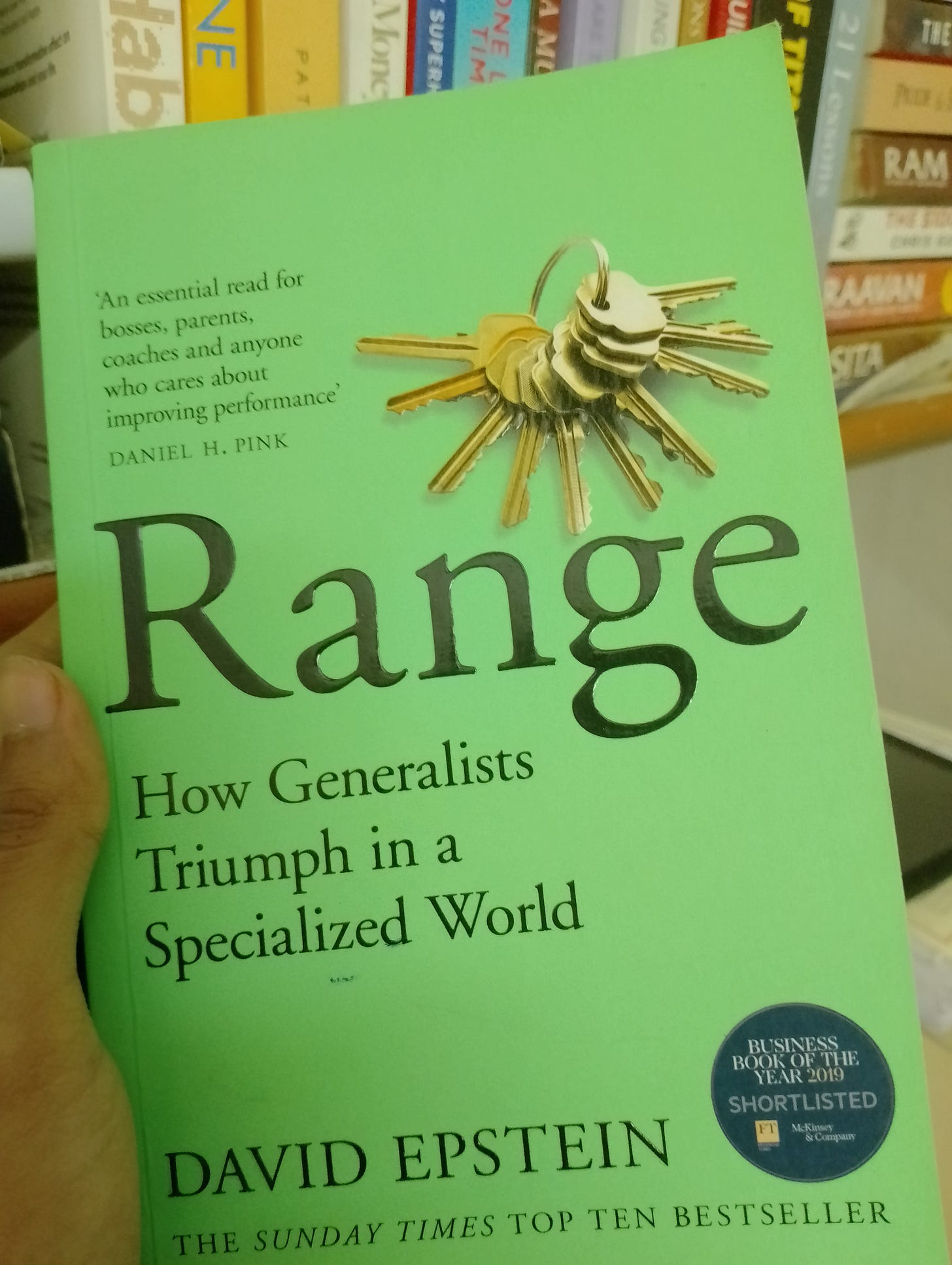Write Better With Dilbert’s Creator, Law of Wasted Efforts, and More
+ Here’s why you’ll fail 75% of the time and why it’s normal.

Before anything else, I want to inform you that I have imported my Medium subscribers’ list onto Substack.
The main reason behind this: I will experiment a little with short-forms and mid-form (<500 words) articles on Medium. I will be selective in sending them your way. I don’t want to clutter your inbox.
That’s why this is. Here, you will receive two emails every week. On Sundays and Wednesdays. Topics included are diverse, so explore and find your corner.
A special welcome. I hope you will love it. Any feedback on how we can improve this newsletter experience for you?
Hit reply (if you are in your email app)
Comment below (if you are on the website)
Shoot an email to vritant@substack.com (let’s talk about anything)
Welcome all to yet another episode of Be Curious.
It’s Sunday and that means it’s time to lay back, relax and read some cool stuff and learn something new.
Spoiler alert: Today’s Let’s Muse section will provide you with a mindset to deal with failures more effectively by forging a positive mindset. You can’t miss it.
Today’s issue at a glance:
Writing: Write better with Dilbert’s creator
History with a Message: Why would a Pulitzer Prize winner commit suicide weeks after winning it?
Book-ish: You don’t need to follow only one of your interests (book: Range)
Let’s Muse: How to deal with failure and why it’s normal to fail 75% of the time
Writing
I came across this 2007 blog by Dilbert’s creator Scott Adams yesterday. It’s mind-bogglingly… simple!
Let me summarise the key highlights for you. It is something worth giving special attention over.
Scott Adams took a business writing course and used its lessons in writing humour. That makes everything he points out in this short and sweet post general and evergreen.
Writers should focus on keeping things simple.
Simple writing is clear as well as persuasive.
Cut off the fluff
words as much as possible.Don’t clog your writing with unnecessary adverbs and connectors.
Don’t write: He was very happy. Write: He was happy.
Try to grab the reader’s attention with your first sentence.
Readers will only spend a couple of seconds if they are not convinced your writing is worth their time. Convince them.
Write short sentences.
Present one idea at a time. Avoid clogging a sentence with multiple ideas.
Use active voice instead of passive.
Readers find it easy to comprehend.
“All brains work that way,” and not “that is the way all brains work.”
Closing thoughts: This is the most straightforward writing guide I can find on the internet. The best part is that it works.
Take it from one of the most famous comic creators. Start incorporating these simple techniques into your writing. They will shine like diamonds.
History with a Message
The story of a Pulitzer Prize winner who committed suicide weeks after winning the award.

Kevin Carter, a photojournalist, won the Pulitzer Prize for Feature Photography award for this picture in 1994.
But only four weeks after receiving the award, he commits suicide.
On 27 July 1994, Carter drove to Parkmore near the Field and Study Centre, an area where he used to play as a child. He locked himself in the car and poisoned it with carbon monoxide using his pickup truck’s exhaust pipe.
In his suicide note, he writes: “I'm really, really sorry. The pain of life overrides the joy to the point that joy does not exist.”
Kevin Carter shot many pictures of war, suffering, death, and moments of injustice with his four-member group, The Bang Bang Club.
Kevin was so obsessed with his job that he totally cornered his mental health. He had witnessed hundreds of people die in front of him. It took a toll on his sanity and calm.
He also faced a public backlash when the photo “The Vulture and the Little Girl” appeared in the New York Times. And on countless other occasions.
He still did his job. The only motivation that kept him going was his passion for bringing the truth, the real story, in front of everyone. He was willing to sacrifice everything to make this happen.
If you look at only a fraction of the photos he took over his career, you will start to feel unwell. Almost all of them have that suffering factor.
But they also told stories worth a million words. And stories move people.
If you want to take a deeper dive, you can read this article which takes you through the whole timeline and life of Kevin Carter.
Book-ish
Is being a jack of all trades and master of none worth it?
I raced through the highlights of the book. Let me tell you, it has got plenty of highlight-worthy lines and paragraphs.
One thing I want to share with you is this one:
“The most effective learning looks inefficient; it looks like falling behind.”
I find this line so true whenever I am out there learning something new. I should make a mental note and remind myself of this every time. So should you.
Be it when I started to learn how to touch-type or the basics of Notion (software). I felt like I was going nowhere.
Many of us quit in this phase. I have had my fair share of experiences doing the same. But with this hyper-changing world, one skill we all need to have is the art of unlearning the old things and learning the new things.
But wait, shouldn’t we specialize in one thing rather than dip our toes in a dozen, you ask?
Valid question.
The author of this book, David Epstein, tries to answer the same question with a term called “sampling period.”
He observed that successful players of particular sports didn’t play only one sport, aka the sport they are experts in. They play a variety of sports. They gain a range of physical proficiencies from which they can draw.
We see it as their “interests.” But it helps them immensely in one way or the other.
Similarly, having already tried your hands on five different things may put you at an advantage when you go out to do the sixth thing.
I would like to plug in a small example from my real life here.
A couple of months ago, I got interested in learning how to touch-type. Or how to type without looking at the keyboard.
There was no immediate incentive for me to try my hands on it. I decided to give it a shot just thinking it would look cool.
Two months later, I have a speed of 60 wpm. I am typing this newsletter out without looking at the keyboard. Much faster than ever before. I also use many keyboard shortcuts.
All of this combined made a huge difference in my life in front of the computer. I will benefit from it for the rest of my life.
But in the beginning, it was all about trying new things. Some turn out to be an insanely valuable skill to possess while others turn out to be a complete waste of time.
Let’s Muse
We all want to succeed. Failure is looked down upon. It makes us quit and question our potential.
“Am I worth it?” “Why do I always fail?”
But what if I tell you it’s completely normal to fail up to 75% of the time?

Shocked? Won’t believe me, right?
But it’s true. It is called the Law of Wasted Efforts.
This is evident across the species. But we as humans have learned to deny its very presence.
Lions only succeed in a quarter of their hunting efforts. They fail at the other 75% of the time.
Most of the seeds of trees are eaten by birds.
Fish fail to bring a large percentage of their eggs to life. Most of them are eaten up by other aquatic animals before they hatch.
Animals have perceived it as normal. It’s almost evident. Failure is just as normal as success.
But in our case, we think that the lack of success in a few attempts is a failure. We are in some kind of a hurry and can’t take a failure just as normally as success.
What are your views on this topic? Do you agree with the aforementioned law and analogy? Do let me know in the comments.
I hope you learned something new from this issue of Be Curious.
Let me know if you want to read something specific in any of the sections. I will be more than happy to write about it :)





